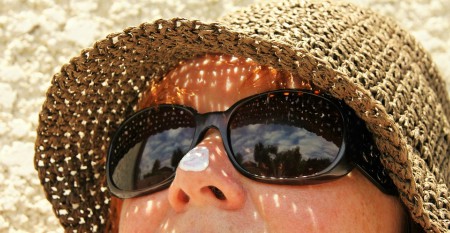Department of Dermatology News
-

Dr. High speaks with Denver7 TV News about sunscreenOpens in a new window
Jun 17, 2024“Cancer that’s caused by the sun is the most common cancer of mankind,” said Dr. Whitney High, a professor of dermatology and pathology at the University of Colorado who also practices at Denver Health and the UC Health system. Watch his feature on Denver7 News.Opens in a new window Full story -

Dr. Kohn comments on Rural Patient Melanoma Study for Medscape articleOpens in a new window
Jun 6, 2024Assistant Professor Lucinda Kohn was asked to comment on the results of a new study that showed rural patients with melanoma fare worse than urban dwellers. Dr. Kohn said the findings echo the results of a recent study which characterized melanoma rates among non-Hispanic American Indian/Alaska Native individuals from 1999 to 2019.Opens in a new window Full story -

Dr. Theresa Pacheco's tips published in Cancer Health magazineOpens in a new window
May 10, 2024University of Colorado Cancer Center member Theresa Pacheco, MD, Associate Professor of Dermatology at the CU School of Medicine, offers these tips for staying safe in the sun.Opens in a new window Full story -

University of Colorado Cancer Center interviews Dr. Mayumi FujitaOpens in a new window
May 20, 2024Trust In Yourself’: Mayumi Fujita, MD, PhD, Has Overcome Challenges in Her Cancer Research Career. After losing a child, the CU Cancer Center physician-scientist came to America as a single mother and had to repeat her dermatology residency.Opens in a new window Full story -

Dept. of Dermatology serves community at Food Bank of the RockiesOpens in a new window
Dec 12, 2023At our inaugural Community Service event on December 11, 2023, twelve department members provided 11,279 meals for those in need to the Food Bank of the Rockies.Opens in a new window Full story -
.jpg?sfvrsn=cc990bbb_2)
Asgari and colleagues receive AAI awardOpens in a new window
Jan 22, 2024Principal Investigator Dr. Maryam Asgari, MD and her team of researchers were awarded an Anschutz Acceleration Initiative grant to develop and test a new skin cancer screening program.Opens in a new window Full story -

Editorial spotlights underreporting of American Indian/Alaska Native melanoma incidenceOpens in a new window
Jan 1, 2024Lucinda L. Kohn, MD, MHS, Assistant Professor of Dermatology, and Spero M. Manson, PhD, Distinguished Professor of Public Health in the Colorado School of Public Health and of Psychiatry, published an editorial in JAMA Dermatology.Opens in a new window Full story -

Maryam M. Asgari named Chair of DermatologyOpens in a new window
Mar 5, 2023Maryam M. Asgari, MD, MPH, has been named the inaugural University of Colorado Medicine Endowed Chair of the Department of Dermatology for the CU School of Medicine, effective May 1, 2023. Prior to being recruited to CU, Asgari served as a professor of Dermatology and Population Medicine at Harvard Medical School, specializing in patient-oriented research in dermatology and Mohs micrographic surgery.Opens in a new window Full story -
.jpg?sfvrsn=2f5aaba_2)
Dr. Dellavalle discusses the importance of diversity in clinical trialsOpens in a new window
Jul 2, 2023Robert Dellavalle, MD, recently spoke with the American Journal of Managed Care (AJMC) about the importance of diversity in clinical trials.Opens in a new window Full story -
.jpg?sfvrsn=24a922bb_2)
New stem-cell technology offers hope for curing "incurable" diseasesOpens in a new window
Apr 21, 2023Husband-and-wife research team Ganna Bilousova, PhD, and Igor Kogut, PhD, in collaboration with Dermatology Professor Dennis Roop, PhD, recently patented two complementary technologies to develop stem-cell created skin grafts, which could translate into cures for those with devastating skin diseases such as epidermolysis bullosa (EB).Opens in a new window Full story